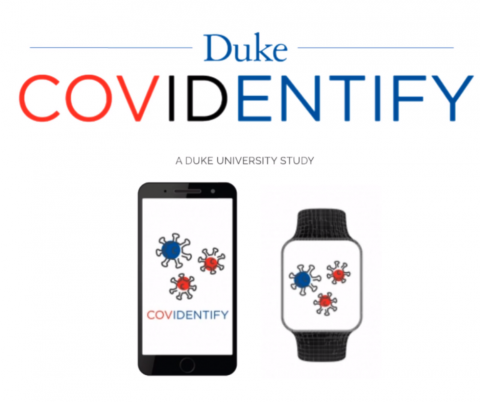Equity and Efficiency of Using Wearables Data for COVID-19 Monitoring (2020-2021)
The coronavirus pandemic has resulted in over 35 million infections and over 612,000 deaths in the U.S. alone as of mid-August 2021. To quickly identify and isolate new infections and clusters, public health officials are seeking new tools to target diagnostic testing for individuals who exhibit symptoms.
In April 2020, Duke launched CovIdentify to test the viability of using wearables to quickly identify individuals who may have contracted the coronavirus. The CovIdentify platform integrates information from widely used wearables with simple daily electronic self-reports on symptoms and social distancing, for up to 12 months. CovIdentify’s overarching objective is to implement existing digital biomarkers and establish new digital biomarkers to develop, validate and translate CovIdentify as a continuous screening tool. Since April, the study has collected data from over 7,500 individuals using a “bring-your-own-device” (BYOD) model.
This project team enhanced and expanded the CovIdentify study by creating a data pipeline to more easily manage and analyze collected data and modifying the iOS application to more easily collect participant information and reduce barriers to symptom reporting. Team members also increased participant engagement through targeted outreach and examined biases that may occur in the BYOD study model. Their research on biases in study design and the potential effects on downstream technology development resulted in a publication, including a set of guidelines for improving demographic imbalances.
Timing
Fall 2020 – Spring 2021
Team Outputs
Dana Pasquale, Whitney Welsh, Andrew Olson, Mark Yacoub, James Moody, Brisa Barajas Gomez, Keisha Bentley-Edwards, Jonathan McCall, Maria Luisa Solis-Guzman, Jessilyn P. Dunn, Christopher W. Woods, Elizabeth A. Petzold, Aleah C. Bowie, Karnika Singh, Erich Huang. Scalable Strategies to Increase Efficiency and Augment Public Health Activities During Epidemic Peaks. June 28, 2023. Journal of Public Health Management and Practice.
Md Mobashir Hasan Shandhi, Peter J. Cho, Ali R. Roghanizad, Karnika Singh, Will Wang, Oana M. Enache, Amanda Stern, Rami Sbahi, Bilge Tatar, Sean Fiscus, Qi Xuan Khoo, Yvonne Kuo, Xiao Lu, Joseph Hsieh, Alena Kalodzitsa, Amir Bahmani, Arash Alavi, Utsab Ray, Michael P. Snyder, Geoffrey S. Ginsburg, Dana K. Pasquale, Christopher W. Woods, Ryan J. Shaw, Jessilyn P. Dunn. A Method for Intelligent Allocation of Diagnostic Testing by Leveraging Data from Commercial Wearable Devices: A Case Study on COVID-19. 2022. NPJ Digital Medicine.
Peter Jaeho Cho, Jaehan Yi, Ethan Ho, Md Mobashir Hasan Shandhi, Yen Dinh, Aneesh Patil, Leatrice Martin, Geetika Singh, Brinnae Bent, Geoffrey Ginsburg, Matthew Smuck, Christopher Woods, Ryan Shaw, Jessilyn Dunn. 2022. Demographic Imbalances Resulting From the Bring-Your-Own-Device Study Design. JMIR 10(4).
Peter Jaeho Cho, Jaehan Jeremy Yi, Ethan Ho, Yen Hai Dinh, Mobashir Hasan, Shandhi, Aneesh Patil, Leatrice Martin, Geetika Singh, John Owens, Brinnae Bent, Geoffrey Steven Ginsburg, Matthew Smuck, Veronica Palacios-Grandes, Christopher Woods, Ryan Shaw, Jessilyn Pearl Dunn. 2021. "Demographic Imbalances Resulting from Bring-YourOwn-Device Study Design." JMIR.
This Team in the News
Duke Researchers Working on Wearable Tech that could Help with Variety of Medical Issues
Duke Research Study that Tracks COVID-19 via Smartphones, Smartwatches Goes Global
Duke, Partners Expand Project Tracking COVID-19 via Smartwatches, Phones
COVID-19, and the Costs of Big Data
Early Detection of COVID-19: How Your Smartwatch Could Help
See related team, Developing Predictive Models for COVID-19 with Wearables Data (2021-2022).

Team Leaders
- Peter Cho, Pratt–Biomedical Engineering–Ph.D. Student
- Jessilyn Dunn, Pratt School of Engineering-Biomedical Engineering
- Ryan Shaw, School of Nursing
/graduate Team Members
-
Oana Enache, Biostatistics - Master
-
Karnika Singh, Biomedical Engineering-PHD
-
Will Wang, Biomedical Engineering-PHD
/undergraduate Team Members
-
Yen Dinh, Biology (BS)
-
Ethan Ho, Biomedical Engineering (BSE)
-
Libba Lawrence, Electrical & Computer Egr(BSE)
-
Aneesh Patil, Economics (BS)
-
Rami Sbahi, Computer Science (BS)
-
Amanda Stern, Computer Science (BS)
-
Bilge Tatar, Computer Science (BS)
-
Jaclyn Xiao, Biomedical Engineering (BSE)
-
Jaehan Yi, Economics (BS)
/zcommunity Team Members
-
Duke Clinical and Translational Science Institute, Community Engaged Research Initiative
